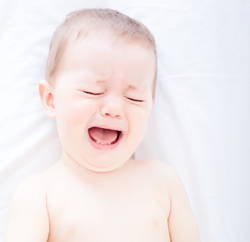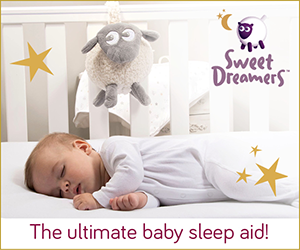Your baby and the common cold

As your baby get’s older and starts to become mobile, she will start putting things in her mouth or touching new things that may not pass your ‘clean’ test. Those curious little fingers will almost always end up in her mouth before you get a chance to wash them. Don’t panic. This exposure to germs will likely make her immune system stronger – but the bad news is, there will be quite a few sniffles and upset tummies along the way!
Hopefully all you get is a case of the common cold and even though there isn’t a cure as of yet, here are some ways to make your little one’s cold easier to bear, both for her and you.
Is it a cold or a flu?
Common symptoms of a cold include a runny nose with clear mucus that will turn yellow or green, and a cough or low grade fever may also be present. A flu is likely to come on quickly, and your baby may also have diarrhea, and or vomiting. If your baby has congestion or coughing without a fever, or before the fever hits – it’s likely a cold.
The best way to check your baby’s temperature is to use a digital ear thermometer. A temperature that is higher than 37.8 °C (100.04 °F) indicates a fever. At the first sign of a cold it’s a good idea to keep bacteria out of your little one’s nasal passage. Since your baby can’t blow her nose, the best way to do this is to use saline drops followed by a nasal aspirator.
Lay your baby on her back, and put a drop of saline solution in each nostril. Next you can gently use a nasal aspirator or bulb syringe on each nostril to suck out all of the mucus. This may take a few tries to clear your baby’s nose. Be patient and have a soft washcloth on hand to clean your baby’s nose. Keeping your baby’s nasal passage clean and clear will also help to prevent ear infections.
If baby is having trouble nursing/drinking milk try cleaning out her nose before each feed.
Running a hot shower and sitting in a steamy bathroom with your baby will help to loosen her congestion.
Introducing a humidifier or a vaporizer, especially in winter months when the air is dry, is a great method to help your baby breathe better at night. Moisture in the air helps with congestion, coughs and sore throats.
A humidifier adds cool moisture to the air and a vaporizer heats up water and creates hot steam, adding warm moisture to the air.
You can also add menthol or eucalyptus to a vaporizer to help your baby breathe better at night. Both are beneficial, just keep in mind that they need to be kept very clean or you may end up adding harmful bacteria and mold to the air.
If you decide to use a vaporizer or humidifier follow the manufacturers instructions and use the product safely.
Put your baby to sleep on an incline. This may help her breathe better which will result in better sleep. You can do this by elevating the top end of your baby’s mattress. Use a mattress wedge or simply roll a towel and place it underneath the top end of the mattress.
Make sure your baby has plenty of fluids and rest. If your baby is under four months old, breast or formula feed on demand. If you’ve already started your baby on solid foods (after four to six months), then you can give her water and diluted juices.
Please call your doctor if your baby:
– is under three months old and is coughing and/or has a fever.
– has a fever for more than three days.
– has a cough that is getting worse.
– is having trouble breathing, is wheezing or gasping.
– is extremely fussy and cannot be comforted.
– becomes lethargic
– has a dry diaper for four to six hours.
– is getting worse instead of better after seven days
Do not hesitate to call your doctor at any time if you are unsure about your baby’s symptoms.
Prevention
– Wash yours and your baby’s hands frequently.
– Try your best to keep your baby away from sick children and adults.
– Insist that family and friends wash their hands before picking up your baby
– Make sure your baby is well hydrated
None of these suggestions will cure your baby but they will definitely make her more comfortable in dealing with her symptoms. It is not advisable to administer cold and cough medication to children under six years of age but if your baby has a fever or is in pain, it is ok to give her infant acetaminophen. If your baby is over six months of age you can choose to give her ibuprofen.
Always check with your baby’s doctor before giving her any medication.
Breastfeed your baby for as long as you can. Health Canada suggests that you breastfeed your baby exclusively for six months and continue with breastfeeding up to two years and beyond. There is no guarantee that a breastfed baby will not get sick, but studies show that babies who are breastfed get sick less often because of antibodies that are present in breastmilk.





